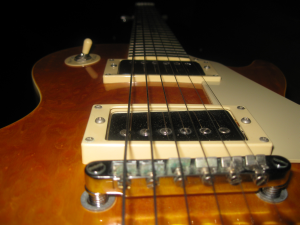“It’s just how I feel.” We’ve all heard it; we’ve probably said it. But what if the “just” is out of place? What if we are held responsible for our emotions?
This is a frightening thought. I know too often I react with irritation at something that does not warrant such a response. The emotion occurs without my direct intention: it is just happens.
Frankly, if I’m responsible, then I’m in trouble.
So, if we are responsible, how does that work?
 I am a guitar player. I started playing way back in 1974, when I took a summer class at Carnegie Junior High. Two of my earliest tunes were Tom Dooley and Jet Plane. Since those early days, I have played hours upon hours, days upon days. I have trained my body and mind to play guitar. Most of the time when I play now, I don’t really think about it. I look at the chord sheet or hear the song in my head and I play. Years of practice translate across fingers and hands into vibrating strings.
I am a guitar player. I started playing way back in 1974, when I took a summer class at Carnegie Junior High. Two of my earliest tunes were Tom Dooley and Jet Plane. Since those early days, I have played hours upon hours, days upon days. I have trained my body and mind to play guitar. Most of the time when I play now, I don’t really think about it. I look at the chord sheet or hear the song in my head and I play. Years of practice translate across fingers and hands into vibrating strings.
After years of playing guitar, I have developed habits. Some of the habits—maybe most—are good. My left hand knows great many of the required chord shapes: the mind thinks a letter, say G, and the hand makes the shape. My right arm knows rhythms and my ears know how to sync my arm with the drums and bass.
Unfortunately, some of the habits are not good. For example, any player who knows proper form will look at my left thumb wrapped around the neck and clack their tongue: my form is usually terrible. My barre chords either depress the bottom strings or the top strings: never both. To change these habits would require new learning—probably to the point of discomfort, if not pain. At the very least, it would require hard work and time.
I could say, “It’s just how I play,” but the truth is, I developed these habits of guitar playing. I am responsible for the good and for the bad.
Emotions are the same. We practice them, we feed them, and we develop habits. Just like the habits of guitar playing, changing the habits of emotion requires hard work, time, and probably some pain.
What now?
Guitar playing is a trivial thing and my bad guitar habits are not causing real harm.
Emotional bad habits are not trivial and the damage they cause is all too real. I need my community to help me develop healthy emotions; I suspect you need yours to do the same.


Pingback: The Assembling of the Church | Comfortable habits